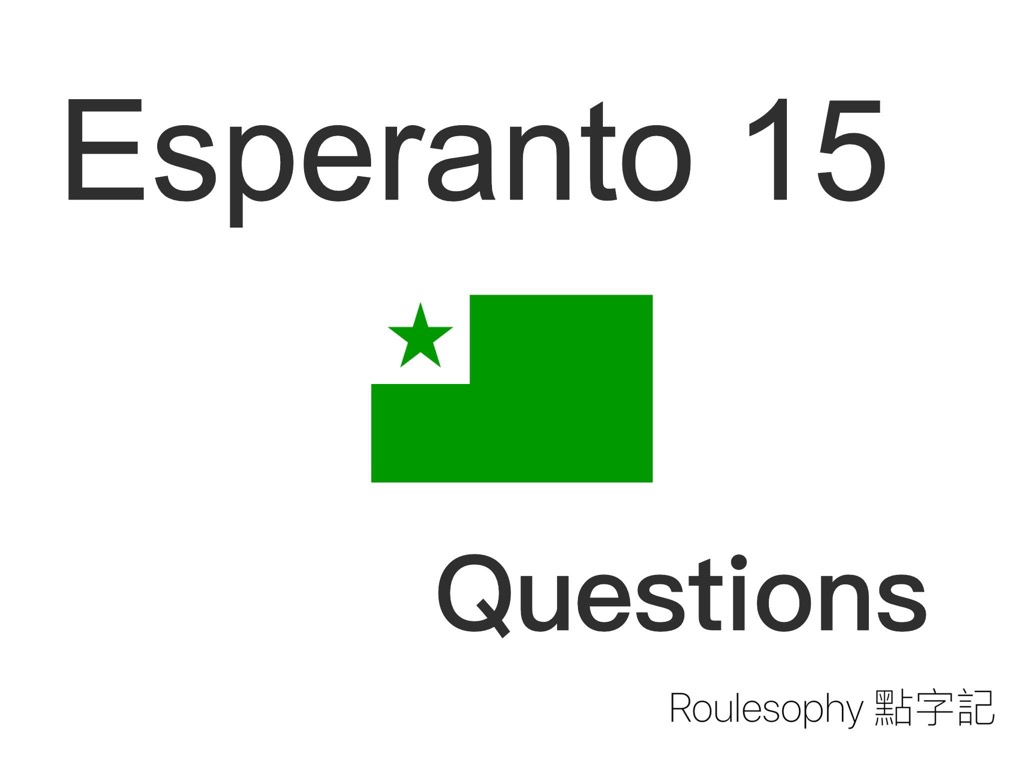Esperanto 15 - Questions

這課是關於疑問句的使用,會用到很多 corelatives 。
文法規則
- 如果放
ĉu在句頭便代表 yes no question,而把ĉu放在句子的中間便代表 whether 的意思,例如 Ŝi volas scii, ĉu mi parolas Esperanton.(She wants to know whether I speak Esperanto)。 - 留意 -u 字尾的 correlatives (e.g. kiu, tiu) 通常後面都是名詞,而這些 correlatives 後面都需要根所屬的名詞作 accusative -n 和 plural -j 。
ĉi是指 close proximity ,所以tie指 here 而ĉi tie指 here 、tio指 that 而ĉi tio指 this 、tiu指 that thing / that person而ĉi tiu指 this thing / this person 。- 有時
kio和kiu用法十分接近,例如Kiu estas via nomo?是 Which is your name? 而Kio estas via nomo?是 What is your name? - 在
kie (where)和tie(there)後加-e有向著那個地方 (to) 的意思,例如Kien vi iras? Mi iras tien.代表 To where are you going? I am going to there. 。
Section 1/3
| Esperanto | English | Comment |
|---|---|---|
| kiam | when | |
| kiu | who/which one | |
| tie | there | |
| aŭto | car | |
| tiu | that | tiuj 是 that 的眾數, 即是 those |
| ĉi | this |
例句
| Esperanto | English | Comment |
|---|---|---|
| Kiu volas manĝi tiun pomon? | Who wants to eat that apple? | |
| Kie estas mia aŭto? Ĝi ne estas tie. | Where is my car? It is not there. | |
| Kiam ŝi manĝas oranĝojn? | When does she eat oranges? | |
| Ni loĝas tie ĉi. | We live here. | |
| Kiun koloron havas ŝia aŭto? | What color is her car? | |
| Tiu ĉi lando havas bonan kafon. | This country has good coffee. | |
| Ĉi tiuj aŭtoj estas bonaj. | These cars are good. | |
| Kiu estas vi? | Who are you? | |
| Tie estas mia aŭto? Ĝi ne estas tie. | ||
| Kiu trinkas sukon kun glacio? | Who drinks juice with ice? | |
| Tiu kafo odoras bone! | That coffee smells good! | |
| Ĉi tiuj aŭtoj estas bonaj. | These cars are good. | |
| Kiu estas tie? | Who is there? |
Section 2/3
| Esperanto | English | Comment |
|---|---|---|
| kial | why | |
| diras | tell | |
| afero | thing | |
| pri | about | |
| demandas | asks | 可以和 al 一齊使用。 |
| respondi | to answer | |
| ĉiom | all of it |
例句
| Esperanto | English | Comment |
|---|---|---|
| Ili demandas, kaj ni respondas. | They ask, and we answer. | |
| Ĉu vi povas diri al mi, kial vi faras tion? | Can you tell me why you are doing that? | |
| Mi parolas pri nia domo. | I talk about our house. | |
| Kio estas ĉi tiu afero? | What is this thing? | |
| Ĉu vi povas respondi la leteron? | Can you reply to the letter? | |
| Tio ne estas via afero. | That is not your thing. | |
| Kion ili demandas al nin? | What are they asking us? | |
| Vi ne scias kion diri. | You do not know what to say. | |
| La afero ne estas grava. | The metter is not important. | |
| Ili demandas nin pri niaj gepetroj. | They ask us about our parents. |
Section 3/3
| Esperanto | English | Comment |
|---|---|---|
| kies | whose | |
| ĉu | whether | |
| instruistoj | Teacher | instruo(instruction) + -ist-(professional) |
| io | something | 在 correlatives 中, i-(some) + -o(object) |
| demando | question | |
| respondon | answer | |
| kien | to where | 留意文法規則的用法。 |
例句
| Esperanto | English | Comment |
|---|---|---|
| Ĉu vi scias la respondon? | Do you know that answer? | |
| La demando de la instruisto estas tre facila. | The teacher’s question is very easy. | |
| Kies libro estas tiu? | *Whose book** is that? | |
| Kien Sofia iras? | Where is Sofia going? | |
| Io estas en la domo. Ĉu vi vidas ĝin? | Something is in the house. Do you see it? | |
| Kial vi ne respondas mian demandon? | Why do you not answer my question? | |
| La respondo ne estas facila. | The answer is not easy. | |
| La instruisto havas mapon. | The teacher has a map. | |
| Ĉu vi scias la respondon? | Do you know the answer? | |
| La instruisto demandas la knabojn pri io. | The teacher asks the boys about something. | |
| Insturistoj often havas demandon, sed infanoj ne ofte havas respondojn. | Teachers often have questions, but children do not often have answers. |
如果你覺得這個內容有用,不妨分享給你的朋友。
這是我的 Facebook、Twitter、Instagram 和 Threads,有興趣的話歡迎 Follow。
如果你認為我的文章有幫助,歡迎 請我喝一杯咖啡。
分類:
Esperanto
寫作日期: 2017-08-06